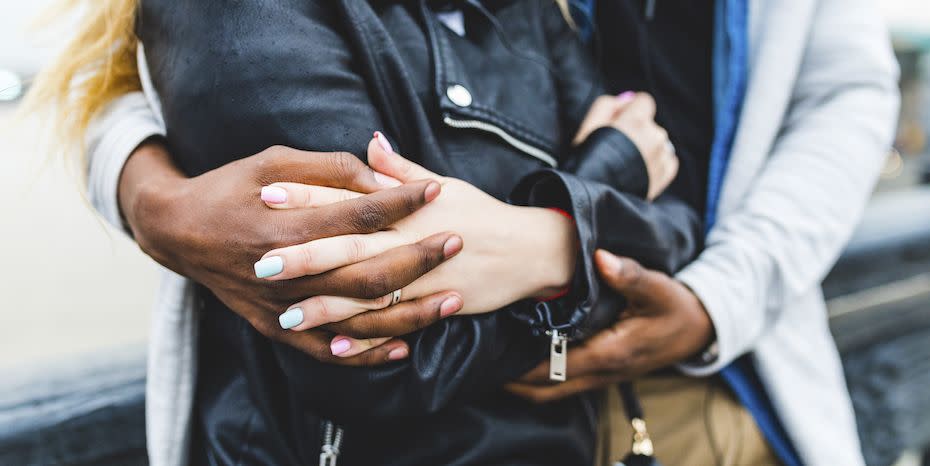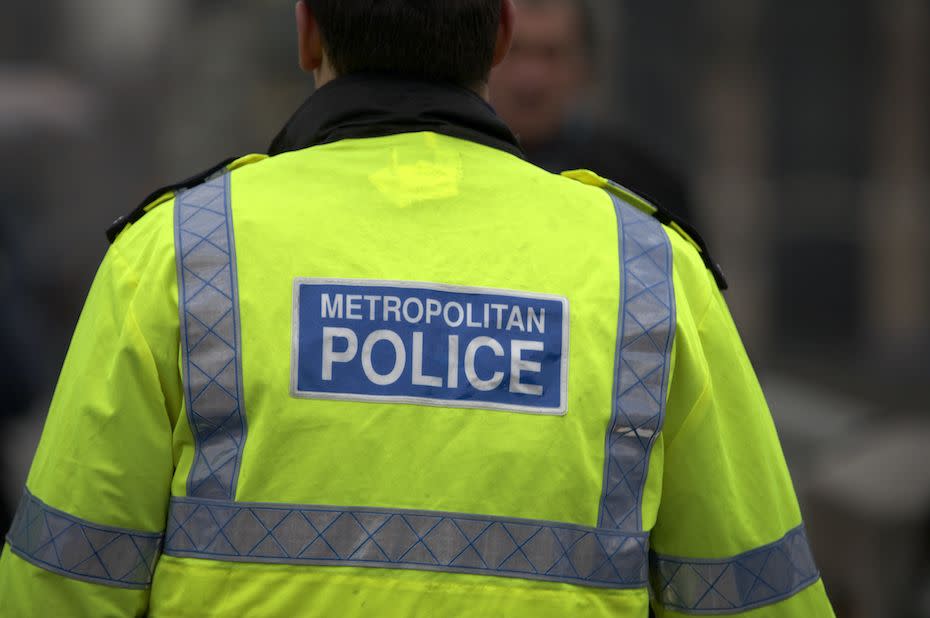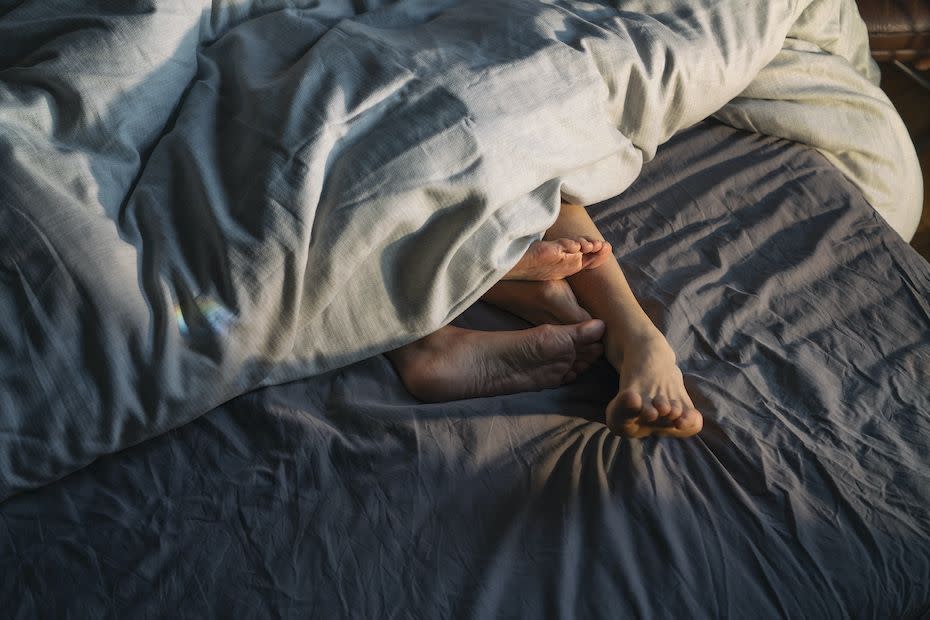What it’s like to find out you’ve been dating an undercover spy...

Falling in love with a spy is something you should read about in the pages of fiction. In a plot involving thrilling car chases in Aston Martins, and martini-fuelled sex in six-star hotels. But, for a number of women in the UK, the reality of dating a spy couldn't be further removed from the James Bond fantasy. For them, it was a case of being groomed, gaslit and ghosted. For years, they believed they were their love stories' protagonists. Little did they know that they were merely pawns in a four-decade-long police operation involving undercover officers.
From 1968 to the 2011, two top-secret undercover police units – the Special Demonstration Squad (SDS) and the National Public Order Intelligence Unit (NPOIU) – were established in the UK to surveil protesters in groups (mostly left-wing) that challenged the status quo. The units’ officers – many married, with children – were instructed to secretly infiltrate activist groups ‘by any means necessary’, per the SDS's informal motto. This included stealing the identities of deceased children, using fake passports and creating long-term, sexual relationships.
During the course of these relationships, some of the officers fathered children. In October 2020, the Metropolitan Police paid a confidential sum of money to an unnamed individual who, at the age of 26, learnt that his father was a police officer, rather than a leftwing activist, as he’d been led to believe. Other victims claim that they were robbed of the possibility of motherhood, as they were unknowingly partnered with undercover officers during the pivotal time of a woman's fertility.
To date, more than 20 undercover officers involved in the units have been identified as having had intimate relationships with unsuspecting women. The true number of how many officers were deployed by the SDS and NPOIU – widely dubbed the ‘spycop network’ – to carry out their operatives is still unknown.
Over the last two decades, several of the women who were deceived by the police officers have conducted their own research into the tactics used by the men to obfuscate and manipulate, and have found shocking overlaps in their experiences. Their tireless efforts to hold the Metropolitan Police to account led to the announcement of a public inquiry in 2014 by the then-Home Secretary Theresa May, which began examining evidence in November 2020.

In 2015, the Police issued an unprecedented and long overdue apology to seven of the duped women. At the time, then Assistant Commissioner Martin Hewitt of the Metropolitan Police described the officers’ actions as "abusive, manipulative, deceitful and wrong". An out-of-court settlement with the individuals has since been made and the women have gone on to form the Police Spies Out of Lives campaigning support group, which works to put an end to the sexual and psychological abuse of campaigners and others by undercover police officers.
As the enquiry continues, we spoke to three out of five of the authors of Deep Deception, a new book which explores the timeline of five women's relationships with police officers and their ongoing mission to uncover the truth behind the lies.
To preface these accounts, the Metropolitan Police told ELLE UK: "Undercover policing has changed significantly with independent judicial oversight of all operations, and past events highlighted in this book in no way reflect modern-day undercover policing."
"We recognise the hurt and distress caused to the authors of this book. The actions of undercover officers who deceived these women into sexual relationships were totally unacceptable."
"We are cooperating fully with the ongoing Undercover Policing Inquiry, which will be examining these cases in detail."
Lisa, an environmental activist involved with the environmental advocacy group Earth First
Former partner: Mark Stone. Real name: Mark Kennedy
During my twenties I was a social justice activist. I spent my weekends attending anti-GM crop, climate change and Iraq war protests, going to festivals and climbing mountains. I was a huge idealist and thought I could change the world.
I was 29 years old when I first met Mark Stone (aka Officer Mark Kennedy) in 2003. We were both members of activist groups and crossed paths at an anti-arms fair demonstration in London. I remember thinking he looked a bit dodgy because of his mirrored wraparound sunglasses. I later learned he wore the shades because he was self-conscious of one of his eyes, which had been damaged following an accident as a child. Looking back, I realise he was good at that – telling you tragic stories in order to build a connection with you. His attentiveness made him stand out. I always felt like I had his undivided attention.
One day a group of our friends went climbing and Mark turned up with brand new climbing gear, which was very unusual. The rest of us owned kit which was begged, borrowed and stolen. At the time, it wasn’t a red flag. Mark told us that he’d had his kit nicked and had paid for the new equipment in one go with insurance money. Soon after we nicknamed him ‘Flash’.
During our six-year-long relationship, nothing made me question his identity. Why would it? He was someone I made big life decisions with. He came to my father’s funeral. It wasn’t until cracks started showing in his personality that I felt something wasn’t right.
The night before the Ratcliffe-on-Soar Power Station demonstration in 2009, Mark had attended a meeting with activists in Nottingham, which ended up being targeted by the police and Mark having his house raided. Over the years, a lot of people in our group had been arrested over demonstrations or had their houses raided. It seemed part and parcel of our cause. But Mark seemed particularly upset about it.
Weeks later, Mark told me he was going to the US for a few months to stay with his brother. He packed up all of his belongings and disappeared. Three months later, without warning, he was back in the UK. Making plans was one of the hardest parts of being in a relationship with him. In retrospect, I realise I didn’t have much freewill in my life back then. Little did I know that everything we did together was governed by whether he was authorised to attended certain events or not. I often picture a folder full of all the authorisations from his seniors that illustrate my twenties.
Months later we went to Italy, as Mark said he wanted to attend an International Animal Rights gathering. One day he went on a cycle ride while I stayed in our van. At that point, I decided to have a rummage through the glovebox and came across an expired passport. The name inside read Mark Kennedy, not Mark Stone. The list of dependents? Two. My world turned upside down and the mountains outside began coming in and out of focus. I then found his phone. It had messages from his kids calling him ‘Dad’. It was another three months before I found out the truth.
Officer Mark Kennedy had joined the police force aged 19, was married and had two children. The person I thought I knew didn’t exist. I was betrayed not only by the person I loved, but also the people who had orchestrated his deceit knowing he had a family.

One of the worst things about the ordeal has been learning how public my private life was during my relationship with Mark. I still don’t know how many people were present in our most intimate moments. It’s hard to think about the police officers, handlers and managers involved. I still don’t know if or why I was targeted. Was Mark instructed to form a relationship with me specifically, or was I chosen because I was friends with a large group of other activists?
Over the years I’ve worked hard to get my life back on track. For so long I felt like I didn’t have free will and I’ve had to question what my life would look like if I had made different decisions. I don’t think I would’ve been single for the last 12 years had I not met Mark. I’m now 48, single, and without a family. I feel the Police took away my right to choose.
Alison, English and Media Studies teacher, and political activist with the Colin Roach Centre
Former partner: Mark Cassidy. Real name: Mark Jenner
I’d come out of a long-term relationship a couple of years before I met Mark and had that confidence and freedom you have in your late twenties. When I met him I was an idealistic teacher working in inner London. My days were spent teaching kids about Shakespeare and Chaucer, and out of hours I was active in my trade union.
I was a member of the Colin Roach Centre, which was named after a young Black man who had died from a gunshot wound at Stoke Newington police station in London in 1983. One day Mark rocked up to the Centre with another activist. A group of us would often go to the pub after meetings and my relationship with him blossomed within a matter of weeks.
Mark seemed to be a working class bloke from Birkenhead – very practical and a bit bashful. We shared the same politics and were both interested in anti-fascism. Many of us in organisations on the Left discussed police and state spies during those years. Surveillance types who would infiltrate organisations like ours that questioned the status quo. The biggest mistake I made was thinking spies would stand out.
While there weren’t any signs Mark was a spy during our relationship, my mother wasn't 100% comfortable with him. I was adult enough to know that you’re never going to meet the perfect person, so even when there were moments of doubt, I didn’t think much of it.
One day I found a Natwest bank card under the name of M. Jenner. The signature on the back was Mark’s. I challenged him on it, and he told me that it was stolen and that he’d bought it off a guy in the pub. He convinced me he’d never do it again and asked me never to tell anyone.
Five years into our relationship he left me, out of the blue. It didn’t make sense. Devastated, I tried to find someone who might know where I could find him. When I went to my address book, I found he’d scrubbed out his grandfather’s address. I even contacted the DVLA and his boss, but everything led to a dead end.
When I found out about Mark’s real identity, I became paranoid that I was being watched. I struggled to distinguish between reality and fiction. In the early days of learning the truth, I didn’t think there was a reason not to believe he didn’t love me. I convinced myself that perhaps he was torn up about what he was asked to do. But when I found out that he was married with kids, I had to reframe everything in my mind.
I believe there was a large overlap between the Mark Cassidy I knew and Mark Jenner, the police officer. I don’t believe he targeted me specifically, rather I was a convenient person who could offer him credibility in the group of activists.
To this day, many of us are in a limbo space of not having any information about the officers fully confirmed. The only ‘new’ bit of information I’ve learnt is that there is a document, titled ‘Touchy Subjects’, which campaigner Celia Stubbs has received. The file contains reports written by Mark at the time we were dating. I still don’t know if the title refers to the contents of the report, whether it’s a codename for one of the officers or more personal issues relating to me.

We fought hard for an apology from the Police and to see Hewitt publicly recognise that the officers’ actions were a violation of our human rights, manipulative and wrong. Now, we’re working hard to ensure the public inquiry finds the Police guilty of institutional sexism.
Naomi, gardener, social justice campaigner and environmental activist with Earth First
Former partner: Mark Stone. Real name: Mark Kennedy
I was a huge optimist and valued honesty and openness during my twenties and early thirties. I first met Mark in 2003. I had a friendship group of activists based in several cities across the UK, which he soon became a part of. He was kind, funny and open.
Two years later we began an open relationship and, ironically, he seemed really invested in the honesty it requires. He was my plus one to my brother’s wedding and, despite not wanting to appear in any of the photos, I felt a huge sympathy for him that day. He’d told me his father had abandoned the family, which had left Mark incredibly vulnerable.
The same year he began dating Lisa, who had been and still is a close friend of mine. Their relationship began to blossom and instead of risking losing my friendships with both her and Mark, I ended things with him.
Still to this day, it’s hard to separate my friend Mark Stone, and the undercover police officer, Mark Kennedy. I struggle with the bureaucracy of it all – to know he had annual leave, paycheques and expenses for equipment.
Until I found out the truth about his deceit, I had no idea spies could work at a domestic level. I thought it happened in times of war, on an international level or in fiction. When I received the call from Lisa telling me Mark was a spy, I couldn’t believe it.
My mum has always said to me that if the mistake I made was trusting people, I should keep making that mistake. I’m determined not to let Mark and the Police take away my trust. But I can’t help thinking I was having a relationship with the State and didn’t even know it. The State gave Mark all the resources he needed to undermine any consent I could ever give. The scary thing is that there’s no indication to say this kind of undercover operation isn’t still happening. There are women who have married and had children with these police officers, and likely others who are unaware that their relationships have been paid for by the State.
Having met with the other women who were deceived by officers, I’ve come to realise just how common certain behaviours between the spies were. They would draw us in, and leave us unannounced. Or say that they were struggling with their mental health, so you’d be empathetic, kind and worry for their wellbeing.
The whole experience has made me question what's real and what's fake. I’ve had to fight to get my self-confidence back. I now question everything about the way this country is run and who it’s run for.
You Might Also Like

